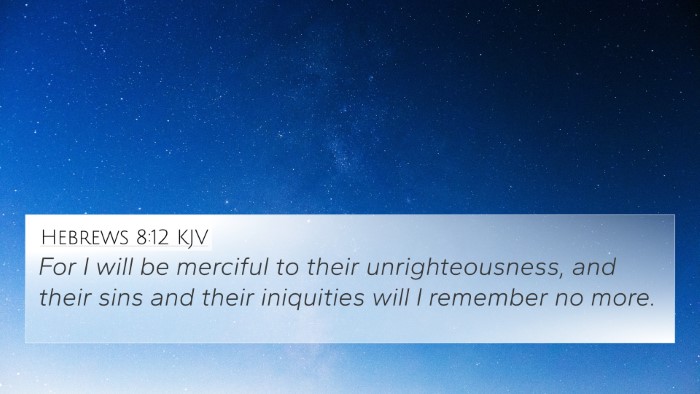Understanding Hebrews 10:17
Bible Verse: Hebrews 10:17 states, "And their sins and iniquities will I remember no more." This verse forms a vital component of the New Covenant message, highlighting the transformative nature of God's forgiveness through Christ.
Summary of Insights
This statement encapsulates profound theological understanding related to forgiveness, the nature of God's grace, and the role of Jesus Christ as the mediator in the New Covenant. Let us explore insights from various public domain commentaries:
Matthew Henry's Commentary
Matthew Henry emphasizes that this verse reaffirms the promise of God regarding His willingness to forgive and forget the transgressions of His people. By referring to the Old Testament, he shows that God’s mercy supersedes judgment, indicating a shift from the Law’s demands to the grace found in Christ. The notion of not remembering sins symbolizes a complete cleansing, liberating believers from guilt.
Albert Barnes' Notes
Albert Barnes insights highlight the significance of the promise found in this verse. He notes that this declaration underscores the finality of Christ's sacrificial work, establishing that once sins are forgiven, they are irrevocably forgotten by God. Barnes also points out that this is a significant theme throughout the New Testament, illustrating the relational aspect of forgiveness between God and humanity.
Adam Clarke's Commentary
According to Adam Clarke, this verse echoes the prophetic words in the Old Testament, particularly from Jeremiah 31:34, showcasing God’s intention to restore and renew His covenant with His people. Clarke further elaborates on the implications of this divine forgetfulness, suggesting that believers can approach God without fear of past sins being brought against them. The concept of divine remission emphasizes the trustworthy nature of God’s promises.
Thematic Connections
This verse relates closely to several themes and scriptures throughout the Bible, facilitating inter-Biblical dialogue on forgiveness and grace:
- Jeremiah 31:34 - "For I will forgive their wickedness and will remember their sins no more."
- Psalms 103:12 - "As far as the east is from the west, so far has he removed our transgressions from us."
- Isaiah 43:25 - "I, even I, am he who blots out your transgressions, for my own sake, and remembers your sins no more."
- 1 John 1:9 - "If we confess our sins, he is faithful and just and will forgive us our sins and purify us from all unrighteousness."
- Romans 8:1 - "Therefore, there is now no condemnation for those who are in Christ Jesus."
- Luke 17:4 - "Even if they sin against you seven times in a day and seven times come back to you saying 'I repent,' forgive them."
- Colossians 2:13-14 - "When you were dead in your sins... having canceled the charge of our legal indebtedness, which stood against us and condemned us..."
Comparative Analysis
This verse serves as a cornerstone for understanding the nature of God's relationship with believers through comparative Bible verse analysis:
- The connection between Old Testament forgiveness and New Testament grace reveals a consistent theme throughout scripture.
- By linking Hebrews 10:17 with its Old Testament references, believers can deepen their understanding of God's unchanging nature amidst the covenantal shift.
Tools for Cross-Referencing
When studying scripture, employing tools for Bible cross-referencing can enhance understanding. A comprehensive Bible cross-reference guide can assist in identifying related verses, while a Bible concordance helps locate specific themes and occurrences in the text. Learning how to use Bible cross-references effectively provides a roadmap for deeper Bible study, illuminating connections between scripture passages.
Conclusion
Hebrews 10:17 encapsulates the beauty of God's grace in the New Covenant, encouraging believers to embrace the freedom found in Christ. As this verse engages in conversation with various biblical themes, it offers hope and restoration. Understanding this promise through the lenses of Matthew Henry, Albert Barnes, and Adam Clarke amplifies the significance of divine forgiveness and encourages ongoing exploration of the Scriptures.




